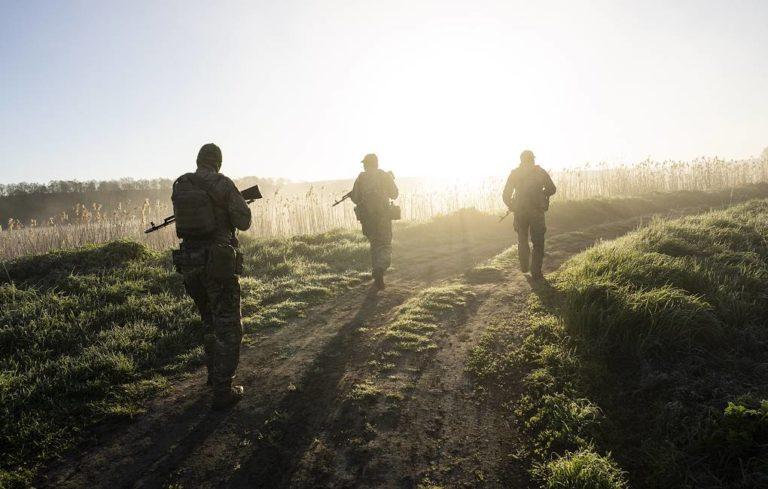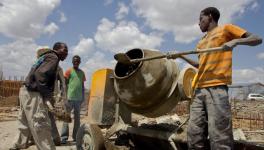US Hopes to Snatch Victory from Jaws of Defeat in Ukraine

Top Ukrainian intelligence official Kirill Budanov has proposed a 100-km-long demilitarised zone between Ukraine and Russia.
The G7 leaders’ 2700-word statement on Ukraine was issued in Hiroshima after their summit meeting glossed over the burning question today — the so-called counter-offensive against the Russian forces.
It is a deafening silence since rumours are swirling about the disappearance of the commander-in-chief of Ukraine’s armed forces. Significantly, President Vladimir Zelensky himself is making himself scarce from Kiev touring world capitals — Helsinki, Hague, Rome, Vatican, Berlin, Paris, London and Jeddah and Hiroshima. It does seem that something is rotten in the state of Denmark.
As the G7 summit ended, the head of the Wagner PMC, Yevgeny Prigozhin announced on Saturday that the Russian operation to capture the strategic communication hub of Bakhmut in Donbass region of eastern Ukraine lasting 224 days, has been brought to a successful completion, overcoming the resistance by more than 80,000 Ukrainian troops.
It is a painful moment for Zelensky, who had boasted before US lawmakers in Capitol Hill last December that “just like the Battle of Saratoga (in 1777 during the American Revolutionary War), the fight for Bakhmut will change the trajectory of our war for independence and for freedom.”
Meanwhile, to distract attention, there is talk now about a subtle shift in the US policy regarding supply of F-16 fighter jets to Ukraine in an indeterminate future. In reality, though, no one can tell what the Ukrainian rump state will look like when the jets arrive. Unsurprisingly, the Biden Administration still seems to be in two minds. F-16 is a hot item for export; what happens if the Russians were to blow it out of the sky with their hi-tech weapons and rubbish its fame?
The Russians seem to have concluded that nothing short of a total victory will make the Americans and the British understand that Moscow means business on the three objectives behind the special military operations that are non-negotiable: security and safety of the ethnic Russian community and their right to live in peace and dignity in the new territories; demilitarisation and de-Nazification of Ukraine; and a neutral, sovereign, independent Ukraine freed from the US clutches and no longer a hostile neighbour.
To be sure, the unprecedented levels of US hostility towards Russia only hardened Moscow’s resolve. If the Anglo-Saxon alliance keeps climbing the escalation ladder, the Russian campaign may well expand the operation to the entire region east of the Dnieper River. The Russians are in this war for the long haul and the ball is in the American court.
What comes to mind is a speech last July by President Vladimir Putin while addressing the Duma. He had said, “Today we hear that they want to defeat us on the battlefield. Well, what can I say? Let them try. We have already heard a lot about the West wanting to fight us ‘to the last Ukrainian.’ This is a tragedy for the Ukrainian people, but that seems to be where it is going. But everyone should know that, by and large, we have not started anything in earnest yet.”
Well, the Russian operation has finally started “in earnest.” The thinking behind the delay is unmistakeable. Putin underscored in his speech that the West should know that the longer Russia’s special military operation goes on, “the harder it will be for them to negotiate with us.”
Therefore, the big question is about the Ukrainian counteroffensive. The Russian forces enjoy overwhelming superiority in every sense militarily. Even if the hard core of the Ukrainian forces who were trained in the West, numbering some 30-35000 soldiers, manage to achieve some “breakthrough” in the 950-kilometre long frontline, what happens thereafter?
Make no mistake, a massive Russian counterattack will follow and the Ukrainian soldiers may only end up in a fire trap and suffer huge losses in their tens of thousands. What would the Anglo-Saxon axis have achieved?
Besides, the Ukrainian military will have so thoroughly exhausted itself that there will be nothing stopping the Russian forces from advancing toward Kharkov and Odessa. Herein lies the paradox. For, from that point, Russians will have no one to talk to.
If past American behaviour — be it Vietnam, Afghanistan or Iraq and Syria — is anything to go by, Washington will do nothing. The well-known American strategic thinker Col. (Retd.) David MacGreggor couldn’t have put things better when he said earlier this week:
“I can tell you that Washington is going to do nothing. And I’ve always warned… we (United States) are not a continental power, not a land power anywhere but in our own Hemisphere. We are primarily an aerospace and maritime power, much like Great Britain. And what does that mean? When things go badly for us, we sail away, we fly away, we go home… That’s what we always do. Eventually, we just leave. And I think, that’s on the agenda now.”
The stony silence of the G7 statement on the Ukrainian counteroffensive is understandable. The G7 statement needs to be juxtaposed with a report appearing in Politico on the eve of the summit in Hiroshima which, quoting senior US officials elaborated on an audacious plan to transform Ukraine war into a “frozen conflict” on the analogy of the Korean Peninsula or Kashmir.
A Pentagon official told the daily that recent military aid packages to Ukraine reflect the Biden administration’s “shift to a longer-term strategy.” Reportedly, US officials are already talking to Kiev about the nature of their relationship in the future.
Principally, if Ukraine’s NATO membership bid stalls, western guarantees could range from a NATO-style Article 5 mutual defence deal to Israel-style arms deals with Ukraine so that “the conflict will wind up somewhere in between an active war and a chilled standoff.”
Indeed, the G7 statement began conceptualising the “Europeanisation” of Ukraine with reforms, market economy driven by private sector and western financial institutions, and boosting Kiev’s deterrent capability vis-a-vis Russia militarily.
It is quite amazing. Hardly has one flawed narrative — espousing Russia’s military defeat in Ukraine and the overthrow of Putin — unravelled, another narrative is being hoisted, predicated on the simplistic notion that Russia will simply roll over and passively watch the US integrating Ukraine into the western alliance system to create an open wound festering on Russia’s western borders that will drain resources for decades to come and complicating ties with neighbours.
However, Russian Foreign Minister Lavrov’s reaction to the G7 Summit confirms that Moscow will not fall into the trap of a “frozen conflict.” Lavrov said, “Could you take a look at those decisions which are being debated and adopted at the G7 summit in Hiroshima and which are aimed at dual containment of Russia and the People’s Republic of China?
“The objective was announced loudly and frankly, which is to defeat Russia on the battlefield, and without stopping at this, to eliminate it later as a geopolitical rival, so to speak, along with any other country that claims an independent place in the world, they will be suppressed as opponents.”
Lavrov also pointed out that the Western countries’ expert community is overtly discussing the order to work out scenarios aimed at Russia’s breakup, and “they do not conceal that the existence of Russia as an independent centre is incompatible with the goal of the West’s global domination.” The Minister said, “We have to give a firm and consistent response to the war declared upon us.”
Yet, it is not as if Americans are incapable of seeing the war through Russia’s eyes. Read here a letter pleading for some sanity in Washington penned by a group of distinguished former American diplomats and military officials associated with the Eisenhower Media Network. By the way, they paid to get it in the New York Times, but the rest of the establishment media chose to ignore it.
Get the latest reports & analysis with people's perspective on Protests, movements & deep analytical videos, discussions of the current affairs in your Telegram app. Subscribe to NewsClick's Telegram channel & get Real-Time updates on stories, as they get published on our website.
























